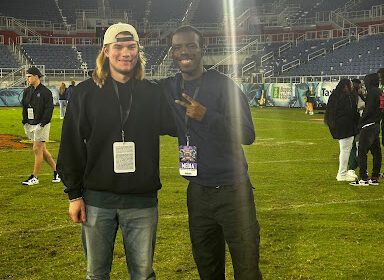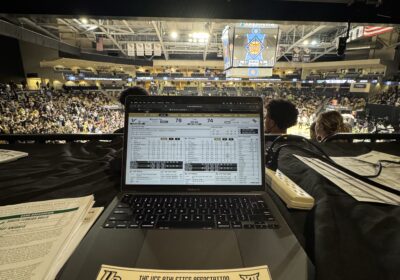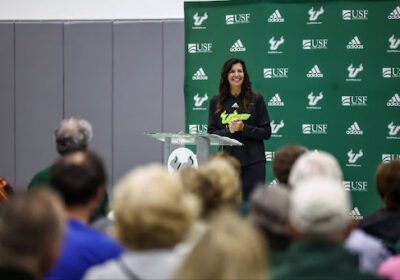Wambach stays true to herself in ULS lecture

ORACLE PHOTO/JACKIE BENITEZ
After 30 years of playing soccer, becoming a role model, activist and celebrity, Abby Wambach has never lost sight of her roots.
She has risen from the runt of a seven-child family to a soccer icon. But the quality that shines through brighter than her vibrant personality is staying true to herself in all facets of her decorated life.
“When I look at myself in the mirror, I’m like, ‘I’m Abby.’ I don’t look at myself and go, ‘There’s gay Abby,’” Wambach said Thursday to a capacity crowd inside the Marshall Student Center Ballroom as part of the University Lecture Series.
“It’s bizarre that we confine ourselves to these boxes and labels, and no matter what position you are, you don’t start being yourself, you just are you,” she said. “You either love me or hate me, and if you hate me, believe me, I don’t care.”
During a nearly 50-minute lecture moderated by Jocelyn Fisher, the senior associate director of athletics at USF, Wambach empowered the crowd, eliciting countless laughs and ear-shattering screams from fans young and old, male and female.
With a tenacity and competitiveness to triumph over any opponent in her path, Wambach said her success stems from her days back home in Rochester, NY and the winning culture instilled in her by her family.
Wambach's 184 goals as part of the U.S. Women's National Team are the most all-time in international play.
“My brothers and sisters never let the youngest kid win all the time,” Wambach said. “They would put the goalkeeper hockey pads on me and slap shots at me. I’m not kidding. They never asked if I was okay. From the time I can remember, I was being bred to be a pro athlete. That nature is just instilled in my DNA.”
A University of Florida graduate — a fact that incited a howl of playful boos from the crowd, including members of the USF women’s soccer team — and a fierce competitor from birth, Wambach was the epitome of a multi-sport athlete playing basketball, baseball, lacrosse and soccer as a kid.
But soccer came naturally, and early on she knew that was her calling. In her first three games, Wambach recalled, she scored 27 goals.
And when her mother, Judy, asked her why she refused to pass the ball, her answer was simple and earnest.
“Isn’t the point of the game to score as many goals and more than the other team?” She recalled saying.
There was no debating her logic, and that fire drove Wambach to become one of the greatest to ever play the game.
But Wambach didn’t really see much of a future in it, though. At that time, in the mid-late ‘90s, being a professional women’s soccer player wasn’t exactly a viable option.
It wasn’t until the 1999 FIFA Women’s World Cup finals victory that the light bulb began to flicker in Wambach’s head.
“I just remember being in awe of how spectacular of an event that was,” Wambach said. “It was the moment that I decided I was going to really dedicate myself to it and put everything that I had to do it.”
Soccer was her “it” factor. It was the one thing in life she knew she couldn’t be beaten at, the one thing that squeezed every ounce of effort and passion out of her.
“Everyone has their thing, their ‘it’ factor,” Wambach said. “It’s just a matter of how you figure out what your specific “it” factor is. I was so lucky that my “it” factor allowed me to work out, allowed me to travel the world, meet new people and play on the grandest stage.
“My ‘it’ factor was soccer for so long and now I’m transitioning, and it’s scary and daunting and terrifying. “
Now retired after bringing a World Cup title back to the U.S., the once-electrifying goal scorer who played in front of millions of viewers has to navigate life without the adrenaline of playing the sport to which she devoted her entire life.
But where some might falter, she looks ahead to how she can help the game and its people.
“Don’t think about it as, ‘What am I going to do with my life?’ No one knows what they’re doing with their life,” Wambach said. “Instead, ‘What am I going to do for my next project?’ What I’m going to do for my next project is change the world. No big deal.”
What she doesn’t realize is that she already has.
As an openly gay athlete, Wambach has given voice to a group that was otherwise voiceless.
“When I got to college, no one was out on my team. I was trying to feel it out when I first got there, and it was this not at all a talked about thing,” Wambach said. “When I then came out to my team, I became an ambassador, and the educator and I realized then that I just had to be me and be over-the-top unapologetic about it, and that made everybody so much more comfortable.
“If you’re timid and you’re insecure about something, that just means you’re not sure of yourself. I was pretty sure of myself. From that point on, I never really questioned myself.”
Years later, Wambach still takes every opportunity to help those struggling and even presented an award to Caitlyn Jenner, a transgender athlete, at the ESPYs when all other athletes who were asked declined.
All of the obstacles and jubilation she endured — the heartbreak of losing a World Cup final and the joy of finally winning one in her final year — have broadened her perspective. With all the sport has given her, she said now is the time to give back.
“I’m so appreciative of all of those moments because the women in my life and those experiences have molded me and shaped my character and shaped who I am,” Wambach said. “I wouldn’t be here without these strong women. But I don’t want to be remembered as just a soccer player. I want to be remembered as a person who put people first.”






